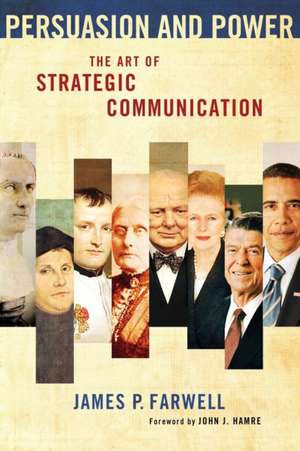Persuasion and Power: The Art of Strategic Communication
Autor James P. Farwellen Limba Engleză Paperback – 27 noi 2012
This is a book about the art of strategic communication, how it's used, where, and why.It examines how people have thought about the notion through the ages, how they have applied its principles, and what lessons for today we can glean from past experience. The book is particularly concerned with strategic communication in US national security and how the current practice of communication in this arena is deficient. Now more than ever in diplomacy and the conduct of military operations, communication strategy is of paramount importance because of the 24/7 news cycle as well as the internet and social media that broaden policy debates and the war of words beyond elites. James P. Farwell, a former political consultant, says that the U.S. government's approach to strategic communication is too stiff and process oriented. His definition of strategic communication follows the lead of political communication, which is more art than science. This model stresses that all words, deeds, actions, and symbols are communication and must be in harmony to effectively and positively influence a given audience. Furthermore, a message that is true, consistent, and persuasive is more powerful than deception. Farwell uses many historical examples to illustrate how strategic communication has made a critical difference throughout history in the outcomes of crises, conflicts, politics, and diplomacy across different cultures and societies. This book will help policymakers, communications officers, and communications students understand when, where and how they can apply the principles of strategic communication.
Preț: 218.66 lei
Nou
41.85€ • 45.17$ • 35.09£
Carte disponibilă
Livrare economică 29 martie-12 aprilie
Livrare express 15-21 martie pentru 26.95 lei
Specificații
ISBN-10: 1589019423
Pagini: 282
Ilustrații: 1 figure
Dimensiuni: 150 x 226 x 25 mm
Greutate: 0.39 kg
Editura: Georgetown University Press
Descriere
This is a book about the art of strategic communication, how it's used, where, and why.It examines how people have thought about the notion through the ages, how they have applied its principles, and what lessons for today we can glean from past experience. The book is particularly concerned with strategic communication in US national security and how the current practice of communication in this arena is deficient. Now more than ever in diplomacy and the conduct of military operations, communication strategy is of paramount importance because of the 24/7 news cycle as well as the internet and social media that broaden policy debates and the war of words beyond elites. James P. Farwell, a former political consultant, says that the U.S. government's approach to strategic communication is too stiff and process oriented. His definition of strategic communication follows the lead of political communication, which is more art than science. This model stresses that all words, deeds, actions, and symbols are communication and must be in harmony to effectively and positively influence a given audience. Furthermore, a message that is true, consistent, and persuasive is more powerful than deception. Farwell uses many historical examples to illustrate how strategic communication has made a critical difference throughout history in the outcomes of crises, conflicts, politics, and diplomacy across different cultures and societies. This book will help policymakers, communications officers, and communications students understand when, where and how they can apply the principles of strategic communication.
